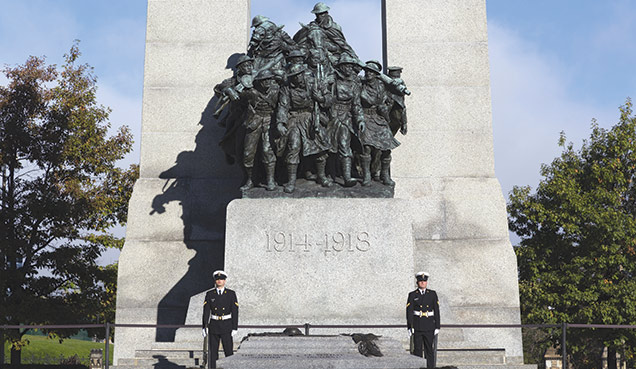The real threat of international terrorism
 CREDIT: MIKEINLONDON/ISTOCK EDITORIAL/THINKSTOCK
CREDIT: MIKEINLONDON/ISTOCK EDITORIAL/THINKSTOCKThe National War Memorial of Canada being guarded on October 12, 2014.
On October 22, Canadian news was cycling word of what we thought would never happen. Two days after a soldier was killed in Quebec, another one was killed by a lone individual possessing a rifle while on ceremonial guard duty at the National War Memorial. The shooter was quickly taken down by security personnel in the Centre Block building, ending the ordeal.
In the age of global terrorist networks, the word has constantly been on our tongues, only appearing in a political context and being used as a pretext for the invasion of countries and war efforts overseas. But what defines terrorism, and how can we be careful to not use it to justify infringing upon the rights on others, be it from individuals to individuals or governments to its people?
First I think our usage of the word has become somewhat of a farce, turning something that could merely be the actions of a mentally ill person to something much larger and more sinister, like a global organization hell bent on sending the world into eternal darkness.
I like to believe that this stems from our perception of “terrorists” and “bad guys” from movies and other forms of media. We tend to see our apparent enemies as a large network consisting of emotionally void and reasonless members. They’re the “enemy at the gates” or the closest thing to organized sociopathy we can think of and that is terrifying to us.
However, what we perceive as terrifying from the sensational and explosive headlines on our news feeds could very well be explained and analyzed using a little bit of history and some elements of sociology.
For more reasons that I could begin to describe right now, there’s many paths that can lead the individual to terrorism. Many of these paths stem from the fallout of neo-liberal economics, decolonization, alienation from society and continued dominance of the third world via capitalism.
These networks of individuals who comprise of extremists are merely a consequence of our own government foreign policy that is upheld with vigour to this day. Truly, we need to be asking different questions if our greatest fear is from a group that received funding/ support from some of our biggest allies.
We must not forget that “terrorism” as a word is emotionally charged to generate fear. This fear is not limited to individual organizations – it is completely limitless in application and that is what makes it an effective tactic of both governments and those who oppose them.
I believe it is important to see terrorism as a tactic rather than a material enemy and thus, we cannot forget that these methods can and are used by the people who have been designated to “protect” us.
As a news junkie, I am extremely active on the Internet whenever a major event breaks out. Thanks to sites like Twitter, reddit, and Facebook, catching wind of a big event in process is astounding easy.
These sites update themselves up to the second via posters who are either working at digging up whatever information they can from the Internet or from the ground themselves.
I followed the Chris Dorner manhunt when it was underway in February 2013, the Moncton shootings earlier this year and the Ottawa shootings at Parliament Hill. As a writer and as a news junkie, I follow these things not because of some desire to cloud my life with negativity but as a way to understand the world that we often forget about when thrusting ahead with our tedious daily tasks.
We choose often to forget the grim realities of war and conflict, because it is seen as a threat to our personal safety whether that threat attacks us physically or mentally.
Editorial opinions or comments expressed in this online edition of Interrobang newspaper reflect the views of the writer and are not those of the Interrobang or the Fanshawe Student Union. The Interrobang is published weekly by the Fanshawe Student Union at 1001 Fanshawe College Blvd., P.O. Box 7005, London, Ontario, N5Y 5R6 and distributed through the Fanshawe College community. Letters to the editor are welcome. All letters are subject to editing and should be emailed. All letters must be accompanied by contact information. Letters can also be submitted online by clicking here.













